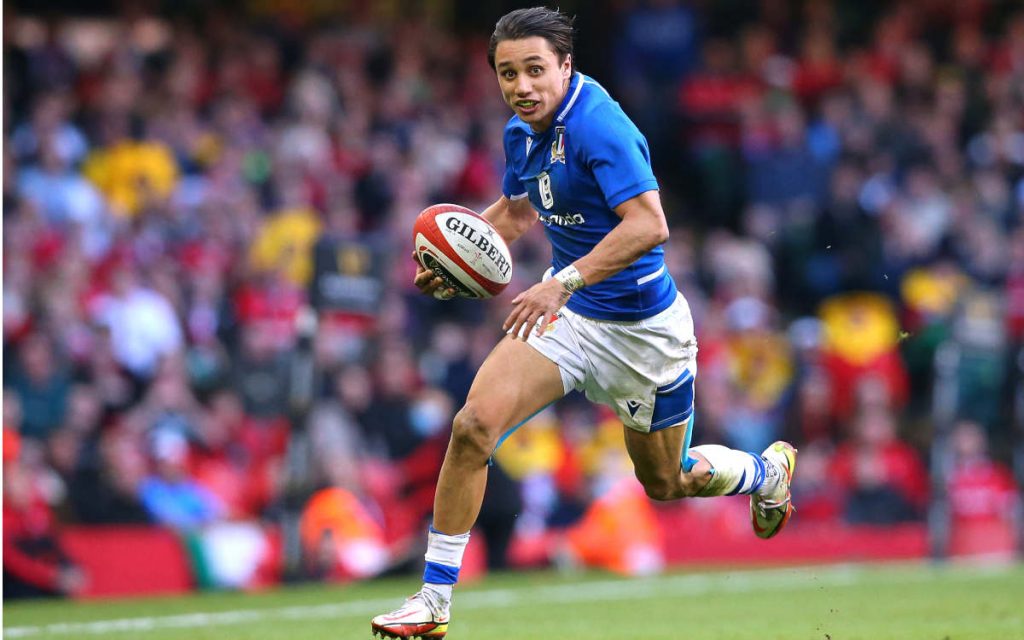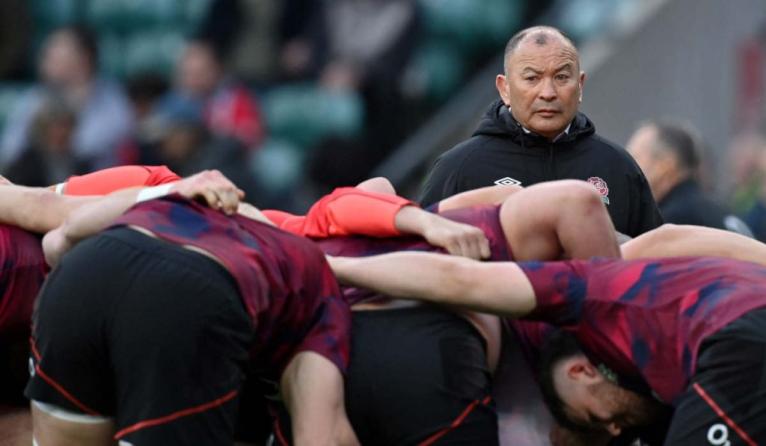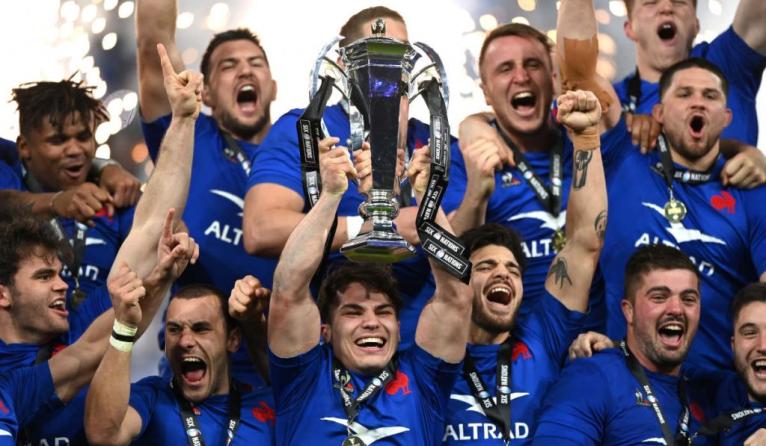A Six Nations which, yet again, inspired a treasury of memories and left every team in the tournament walking away under a heavy headline. Where do you start? The imperious French, the free- flowing Irish, the misfiring English, the maddening Scots, the wasteful Welsh or the born-again Italians? The propriety of the final table, I suppose, demands a clear pecking order but the emotions say otherwise. How exactly do you explain the significance of the seemingly inexplicable?
Pablo Garbisi once promised that when Italy finally won a game in the Six Nations he would burst into tears: stretched out on the Cardiff turf at the final whistle, he was true to his word. And what would have brought a tear to every Italian eye wasn’t just a famous win but the manner of it; down, seemingly out and yet trusting to instinct and resolutely refusing to roll over. It was a game that summed up where they’ve been and, fingers firmly crossed, where they’re now heading.
It’s tough to imagine what impels a team that’s lost 36 straight matches in seven consecutive years to wake up each Six Nations’ morning and put its boots on. Outstanding coaching would have to be high on the list – Kieran Crowley – that and the unshakeable ambition of youth in a team where the average age is just 23. But however they’ve done it, Italy have gloriously redefined the meaning of the word tenacity and, whatever the doom vendors and crepe hangers have been saying, it now behoves the rest of the Six Nations to invest some trust of their own in the Italians’ tireless self-belief and hard work.
Look at it this way. Italy not only scored more tries against Scotland, Wales, France and Ireland (5) than England (3) but beat the English (and the Scots and the Welsh) in the U20 Six Nations. No one in the Championship made more tackles than Michele Lamaro (86), more turnovers than Toa Halafihi (6), more offloads than Monty Ioane (9) or won more line outs than Federico Ruzza (28). And in the snake-hipped Ange Capuozzo, they’ve unearthed an eleven-stone assassin, the classiness of his match-winning run was bettered only by Josh Adams’ handing him his Man of the Match medal on their lap of honour. Both were indelibly memorable.

Wales, for their part, need to hide their bootlaces, a tournament that began and ended with a whimper and will leave the entire rugby nation sleeping with a rock under the mattress for weeks to come. Fifth, first and fifth in their last three Six Nations not only beggars belief but rational explanation and Dan Biggar’s dark, almost apocalyptic post-match interview on Saturday raised uncomfortable questions that’ll take some answering. Not for the first time, his blistering honesty did him huge credit.
Scotland, too, are in a pit. Indiscipline on the pitch invariably suggests some sort of disconnection but indiscipline off it raises rather more than just a suggestion; indeed, your skipper and a clutch of senior players defying curfews, coaches and the team’s culture might almost be ranked as mutinous. Whatever’s going on, Test rugby’s most frustrating fifteen just aren’t adding up right now and the arithmetic will take some working out.
According to the RFU, England are making ‘solid progress’ via a ‘clear strategy’. An almost Johnsonian soundbite given Eddie Jones’ team finished 11 points shy of second place
No such worries for England, though, who, according to the RFU, are making ‘solid progress’ via a ‘clear strategy’, an almost Johnsonian soundbite given Eddie Jones’ team finished 11 points shy of second place and it was nothing more than points difference that kept them above the waterline. Then again, when your blazer is intractably snagged on Eddie’s gatepost, room for manoeuvre is – perforce – limited.
The tap rooms of England will be somewhat less sanguine. ‘Jam tomorrow’, again, reeks of redundant Toryism, the more so when you’re the fattest cat on the rugby planet; factor in too that the top two teams in the table – by an indecent margin – owe much of their pre-eminence to a couple of blokes from Wigan. Eddie Jones’ players may sing his praises to the poets of the press box – and precisely what else would you expect them to say – but the Head Coach appears to have lost not only too many games but the dressing room of public opinion.

Indeed, if you’re talking about ‘solid progess’ and ‘a ‘clear strategy’, you’re surely talking Ireland who ride out of the tournament with swollen saddlebags, not least some well-earned tin; indeed, if you beat every other Home Union’s backside with a bonus point, then a Triple Crown is indisputably yours. And yet – and yet – the Irish will perhaps wonder what might have been had they got off the bus ten minutes earlier in Paris. Regrets? There are always a few.
But in full rinse, Ireland are a joy to watch; indeed no one scored as many tries (24) or conceded fewer (4). A pinch more patience might help, that and a better understanding of how to tweak the recipe in the heat of the kitchen but the ingredients are all there. A 3D poster of Hugo Keenan has replaced Romain N’Tamack on my bedroom wall and none has become more influential to Ireland’s remorseless rhythm than the omniscient Jamison Gibson-Park. Chuck in an emphatic Green Slam for the Irish U20s and there’s, clearly, plenty more in the tank.
Much of the credit for this more feline France has to go to Fabian Galthie, by no means the first to identify the fundamental flaws of the French team – discipline, defensive desire – but the first to seriously steel himself to a root-and-branch overhaul
And speaking of Slams, well; judging by the post-match party in the City of Lights, it was worth the wait, the scary thought being that, on the night, twenty-five points felt like the very least France could’ve scored. No question, the fixture schedule fell their way in terms of the who, the where and the when but, equally, the best team in the tournament took full, almost savage, advantage.
Their stand-out performance? Without doubt the tenuous win over the Welsh in Cardiff. Stick with me here, I’m serious. One of the defining talents of Tiger Woods was always his ability to grind it out; in other words, his one crap round of the week would invariably be three or four shots better than yours, so even on those rare days when he was struggling to hit a bison’s backside with a banjo, he’d invariably totter into the scorer’s tent and sign for a 70. Thus, it seems now, with the French; they have found their inner pussycat.
Much of the credit for this more feline France has to go to Fabian Galthie, by no means the first to identify the fundamental flaws of the French team – discipline, defensive desire – but the first to seriously steel himself to a root-and-branch overhaul; enter the emigre Edwards, a bald man who would cheerfully fight you for a comb. He and Galthie are cut from the same slice of uncompromising cloth and, right now, so is their team.

Sharper analytical minds than mine can lift up the bonnet of the French defensive system and offer you a tour of the finely-tuned mechanics but you don’t need to be a grease monkey to spot the difference in performance and, crucially, self-assurance and confidence. And when you hitch all that to one of the fastest, slickest and most aerodynamic attacking designs in the world and then toss the car keys to the likes of Dupont and N’Tamack, you’re motoring.
Mindset is everything here. Edwards says he offers a bottle of post-match champagne to his Defender of the Day – Dom Perignon no less, at €200 a throw – and, apparently, Antoine Dupont is miffed off because he’s not yet won one. Why would he care? He’s a scrum-half, for crying out loud. Yet here’s – arguably – the best attacking player on the planet now straining every sinew to up his defensive game and earn himself a bottle of bubbles. It screams volumes. Indeed, the team now looks so disciplined and defensively focused that Edwards could cheerfully swap the pop for last week’s elastic band and still provoke an all-out bunfight for his appreciation.
So, it was some tournament, worthily won and in stonking style. Given the spectacle and the weight of the moment, you’d have swapped your teeth to have been pitch-side in Paris but watching France2’s stunning coverage in the company of Nick Mullins, Ben Kay and David Flatman was a hefty consolation. I’ve been trying to remember when I last heard a better 80 minutes of commentary. For the life of me, I cannot think of one.


Top level journalism - a joy to read!